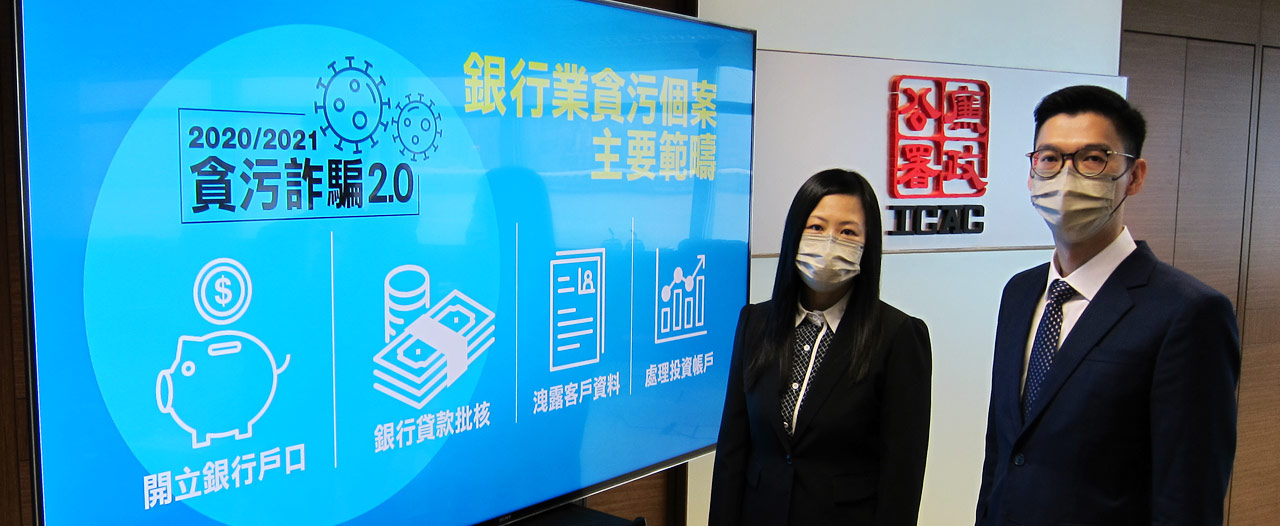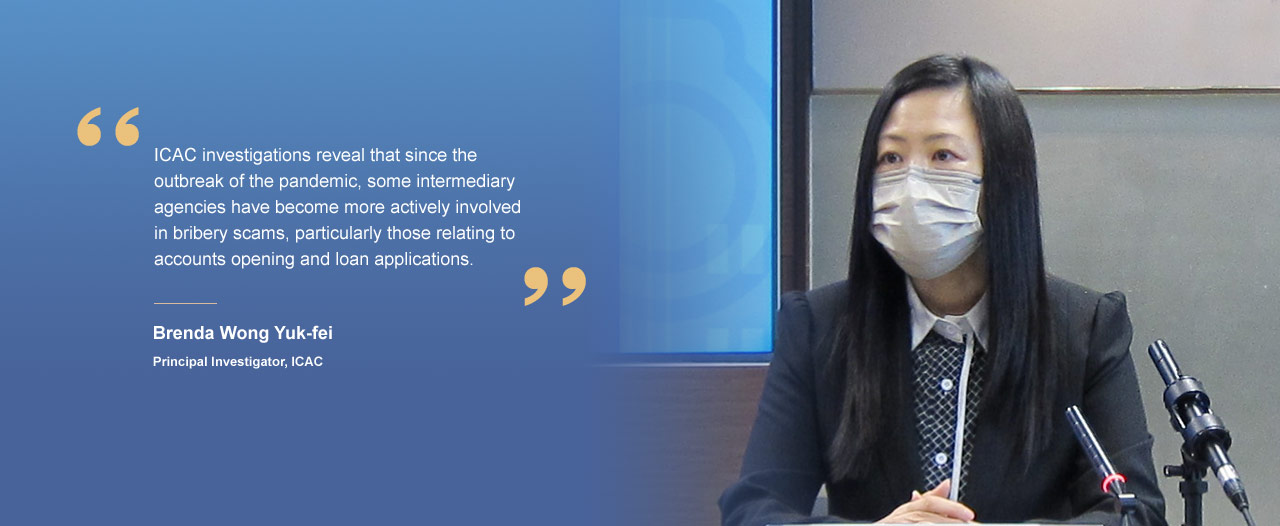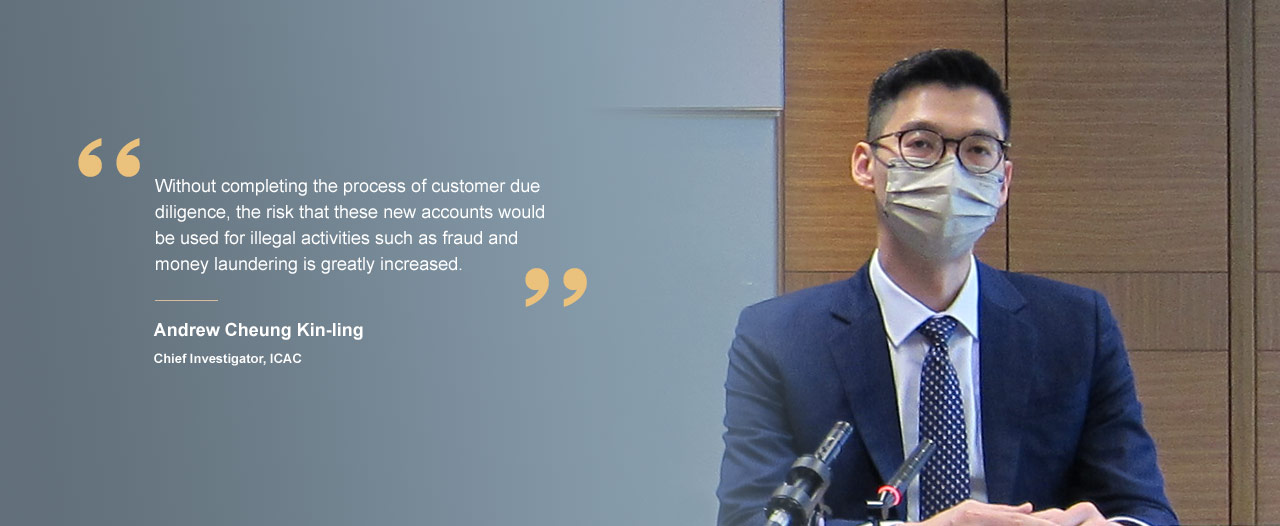
Hong Kong is an international financial centre with over two-thirds of the largest 100 banks in the world having a presence in the city1. The banking industry in Hong Kong is generally clean with a solid probity culture and its practitioners committed to high integrity standards.
Corruption complaints concerning the banking industry accounts for about 6 to 7% of private sector complaints, or about 2 to 3% of the total number of complaints received by the ICAC each year. While the situation is hardly a cause for one to raise an eyebrow, yet the ICAC never lets its guard down.
At a recent press briefing, ICAC investigators specialised in bribery investigation in the banking industry noted that in the past, major areas of concerns in the sector included bribery in account opening, loan applications, unauthorised disclosure of customer information and handling of investment accounts. While an emerging modus operandi was detected lately by graft busters, the problem was nib in the bud after swift enforcement actions.
ICAC Principal Investigator Brenda Wong Yuk-fei, who heads a group responsible for investigating corruption cases involving the banking industry, said some criminals and dubious intermediary agencies had taken advantage of government reliefs to small and medium enterprises (SMEs) under the COVID-19 pandemic and instigated corruption-facilitated scams involving loan applications and account opening.

In Hong Kong, SMEs consist of manufacturing enterprises which employ fewer than 100 persons and non-manufacturing enterprises which employ fewer than 50 persons. The sector accounts for more than 98% of the total number of local enterprises.
As most of the 340,000 SMEs are in the import/export trade and wholesale industries, their businesses are inevitably hard hit by the pandemic. To ease their cash flow problems, the Hong Kong government has offered individual SME applicants a special 100% guaranteed loan of up to HK$6 million.
While SMEs could apply directly with banks for the government-guaranteed loans, recent ICAC investigations found that some intermediaries had approached SME operators to offer them a “one-stop” service.
Wong said staff of the intermediaries were found to have bribed bank officers to obtain loan approvals for SMEs, and false supporting documents such as payslips and proof of rental payments were submitted to falsify the business turnovers and number of employees of the SME applicants.
“Some of the SMEs faced genuine hardships. Unfortunately they were approached by these unscrupulous middlemen who resorted to corrupt and fraudulent means and abused the system. We also found that some of these SMEs were only shell companies without any business activities,” Wong added.
In a recent ICAC operation, a number of intermediaries, bank officers and loan applicants were netted for suspected bribery and fraud in relation to obtaining inflated loans under the scheme, totalling over HK$40 million. The operation also successfully stopped the banks from approving some of the fraudulent loan applications.
Joining Wong at the press briefing, ICAC Chief Investigator Andrew Cheung Kin-ling recounted another new found “variant” of a core corruption concern—account opening.

Due to travel restrictions imposed under the pandemic, non-Hong Kong residents who wanted to open local bank accounts faced difficulties to do so. Those middlemen thus seized the opportunity to approach potential bank account opening clients, claiming that they could offer services to complete all the procedures required without having to travel to Hong Kong.
As part of customer due diligence, most Hong Kong banks required their account-opening applicants to meet the bank officers in person for an assessment of their financial sources and the nature of the accounts.
Citing another operation recently mounted by the ICAC, Cheung said some intermediary companies were found to have offered bribes to bank officers for assisting applicants to open accounts without going through proper procedures and customer due diligence. False documents purportedly showing that the applicants were in Hong Kong were also seized.
“Without completing the process of customer due diligence, the risk that these new accounts would be used for illegal activities such as fraud and money laundering is greatly increased,” Cheung stressed.
The ICAC will keep strengthening anti-graft collaboration with counterparts in the banking industry through law enforcement, prevention and education, to uphold the integrity of the banking system and sustain Hong Kong’s status as a premier international financial centre, Wong and Cheung concluded.
1Source: Hong Kong Monetary Authority. (www.hkma.gov.hk/eng/key-functions/banking)
Some intermediary agencies have become more actively involved in bribery scams, Brenda Wong says.
“Variants” are found in the modus operandi of banking-related bribery under the pandemic, Andrew Cheung says.